#i will construct a narrative
Explore tagged Tumblr posts
Text
This Gax drama during the Charlos Divorce Weekend reminds me of when people get into fights at funerals. Like I'm trying to grieve here, can you wait and do this some other time?
#I love max#I will defend him#But the two of them need to hold off on the drama for a week#there's bigger fish to fry#WCC is still on#Also this whole sport is a soap opera to me#i will construct a narrative#f1#carlos sainz#charles leclerc#max verstappen#charlos#gax
202 notes
·
View notes
Text
I'm re-reading the Discworld series for reasons, and honestly the most relatable part of reading these as an adult is how many of the protagonists start out being tired, used to their little routine and vaguely disgruntled by the interruption of the Plot. Sam Vimes wants to lie drunk in a gutter and absolutely doesn't want to be arresting dragons. Rincewind is yanked into every situation he's ever encountered, though he'd much rather be lying in a gutter too. (Minus the alcohol. Plus regretting everything he's ever done said witnessed or even heard about fourth-hand in his whole life.) Granny Weatherwax is deeply suspicious of foreign parts and that includes the next town over; Nanny has leaned into the armor of "nothing ever happens to jolly grannies who terrorize their daughters-in-law and make Saucy Jokes"
Only the young people don't seem to have picked up on this---and that's fortunate, because someone has to run around making things happen, if only so Vimes and Granny and Rincewind have a reason to get up (complaining bitterly the whole time) and put it all to rights. Without Carrot, Margrat, Eric, etc. these characters don't have that reason; they're likely to stay in the metaphorical gutter and keep wondering where it all went wrong or why anything has to change.
............well, that's not quite true. You get the sense that Vetinari knows how much certain people hate the Plot. And as the person sitting behind the metaphorical lighting board of Ankh-Morpork, he takes no small pleasure in forcing the Plot-haters specifically to stand up, and say some lines.
#I finished guards guards just yesterday and I forgot that vimes and wonse were set up to be mirror images#both boys from the shades of very different natures; who made good (ish) in wildly different ways#also it's interesting reading this books from an adult perspective; my mind isn't blown that these books exist#anymore; plus I've read so many good books since#and they're not perfectly constructed novels! especially these early books;#there are plenty of spots where I can feel the narrative get thin; where there's more handwaving than I remember#but each book IS better and tighter; the jokes are funnier and the irony sharpens; the footnotes are better utilized#the characters are getting more interesting and complicated as opposed to set-ups for jokes.#it's an illustration of someone getting better at their chosen field and that in itself is more impressive than I was anticipating.#discworld
5K notes
·
View notes
Text



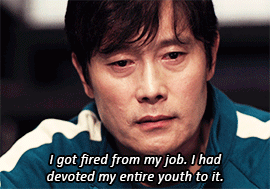


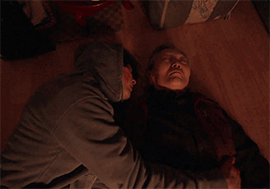
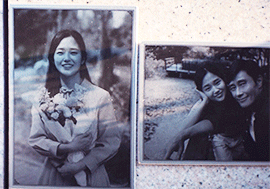
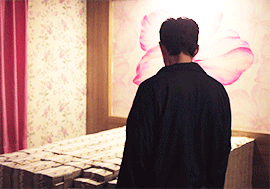




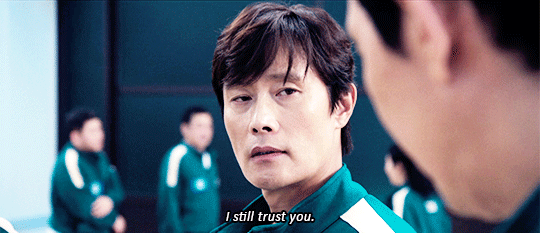
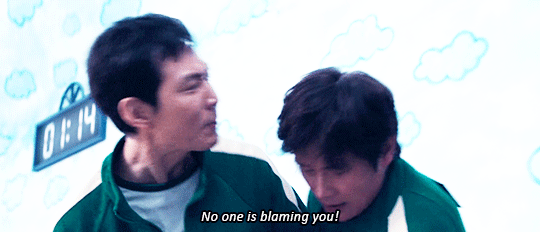



One man. Three personas. Each one a foil to the protagonist in a different way.
#squidgamegif#squidgameedit#squid game#seong gi hun#hwang in ho#oh young il#frontman#characterization#literary devices#hey man every version of me is perfectly in contrast with you in a different and impactful way is it CASUAL NOW???#the fun thing about fandom is that is can be indistinguishable from homework#anyway i have been thinking about this all day and uh just traded some sleep in order to get this done#also like i was a physics and math major so my literary analysis skills are solely based on obsessing over tv and book characters#that is to say i am not *good* at this but my brain just does it and i'm just along for the ride#when i said i had capital T Thoughts about squid game and constructing a compelling narrative...#analysis
382 notes
·
View notes
Text
star trek tos is deeply entrenched in its identity as a 60s tv show for better or for worse (both) but i think retroactively the city on the edge of forever ends up showcasing this more now since its set in a time we can now as 21st century viewers connect with being closer to the time it was produced, rather than the nebulous 23rd. it's interesting because for me i think the single episode informs the way i connect an imagined future to the actual real 1960s the show was written in, particularly in the language and the way relationships between characters are depicted in the way they speak to one another. in that single episode it suddenly feels that the coded language everyone uses, the subtext, the hints and euphemisms is a necessity of the world rather than a feature of the show. and suddenly (for me, at least) that totally shapes the rest of the way i view the rest of the original series. though the way they speak to one another doesn't really tangibly change all that much, when they're placed in the setting of the 1930s the way that kirk and spock speak to each other and about one another entirely shifts.
edith asks kirk in regards to his relationship with spock "I still have a few questions I'd like to ask about you two. Oh, and don't give me that 'questions about little old us' look, you know as well as I do how out of place you two look here." which. well. hello. and later when she asks "Why does Spock call you captain? Were you in the war together?" and kirk says "we... served together" its like yes the obfuscation of their identities and who they are to one another is a necessity of the plot and time travel reasons but i also can't pretend that particular response doesn't color kirks line 2 episodes later in amok time "you've been called the best first officer in the fleet, that's an... enormous asset to me" in a different light. the necessity of secrets and closed doors and frantically having to conceal themselves and their tiny little apartment with a pair of twin beds and ediths "you, by his side as if you've always been there and always will" and "'Captain'? See, even when he doesn't say it, he does" well i can't act like it doesn't change the way i see their enforced professional distance in other episodes, even when they're back safe in their own century. its why The conversation cut from the original harlon ellison script hits seriously i think. it's like a deeply personal confession of desire for a life that could never be: "On my world the nights are very long. The sound of the silver bird against the sky is very sweet. My people know there is always time enough for everything. You would be comfortable there" and a wistful acceptance ("All the time in the world...") in another time in another life in another place it could be but just not this one. spock's endless resignation. well it just changes everything for me. star trek is about the 1960s!!!!!!
#star trek#txt#this mess of thoughts#this city on the edge rewatch was deeply and profoundly moving for some reason this time#i have to wax poetic about it now.#its also like this isnt even scratching the SURFACE of my metatextual analysis of how the subtextual coding of their relationship is not#just a feature or necessity of the show but how it functions narratively and as a part of the social context for the constructed tos future#AAAAAA
288 notes
·
View notes
Text
I get why people sometimes like to retcon show!Armand’s parents selling him into slavery but if I’m being honest I think it’s actually pretty important for them to keep that narratively going forward. It was just such a common way for people to become enslaved throughout all of human history. It presents a very difficult reality but one that I think is integral to understanding how these things perpetuate in the first place.
I know people can have this instinct to go “oh well that’s just too sad” and like I get it! There’s an impulse to give Armand some kind of reprieve from his history of suffering. But also. A lot of real life people have histories just like that. A lot of trafficking victims are trafficked by a parent or an older sibling. A lot of victims previously had an unstable or difficult home life that made them vulnerable to trafficking, even if they were never trafficked by a family member.
A lot of real life people have lives that look like that. There’s no secret hidden surprise memories that their parents actually really loved them. Sometimes things were just always kind of bad. Sometimes that’s just how it is. And those people can still go on to heal and have a better life. There is no “too sad.” There’s just the actual diverse range of human experiences and perseverance.
(Also I understand the argument of “but Armand himself doesn’t remember!” but tbh I think it’s evidence of people not really understanding how repressed memories/dissociative amnesia works. If Armand can say out loud, with conviction, that Arun’s parents sold him into slavery, it’s probably because he knows it to be true, down to a gut instinct. Sometimes those bone-deep feelings are all you have when the detailed episodic memories are nonexistent. The vague knowing is also a type of memory.
If Armand thinks that is what happened that is probably what happened. Questioning his recollection when his sense of connection to that history is already so unstable almost feels kind of cruel if you’ve been in those shoes; but I get that’s not people’s intention! People just want a reality where he didn’t have to suffer as much and I feel for that.)
#I also think him dying from poison would be boring and that it’s way more interesting for the narrative they’ve constructed in the show#for him to die of just an entirely random illness but 🤷#also like… his backstory doesn’t need to ~secretly~ be more like book armand’s. it can just be different.#iwtv tv#armand#iwtv#the vampire armand
268 notes
·
View notes
Text
are we at the point where we can admit most of the Shifty hate is just plain old misogyny, or are we still not ready for that conversation
#'she's manipulating the narrative to be in her favor!' so is Narrator#'she always takes away the vessels before they can leave!' question: wtf do you think the construct is?#'she doesn't care about our opinion!' disagreeing with you =/= not caring about your perspective#it's all 'let women be messy and complicated' until you actually have to engage with that woman in good faith#stp-posting#sal rants#am I strong enough to main tag this?#(nope. I'm not. rip)#slay the princess#< actually. fuck it we ball#this post has been in my drafts since march 7. time to release it into the wild (heh)
113 notes
·
View notes
Text

#i could spend hours talking about how wonderfully unsettling some of the horror is#or how compelling all of the relationships are or how the narrative is such a perfectly constructed tragedy#but honestly instead you should just spend that time going and playing it yourself#little goody two shoes#lgts
307 notes
·
View notes
Text
In the end, it is extremely vindicating to see the various accusations levied re: why people don't like Campaign 3 because like, in the end, most of the people who do like campaign 3 are desperately insecure people who cannot live with the idea that someone else doesn't love the thing they love. Like yeah, if it makes you feel better, sure, call me a stupid jesus freak centrist edgelord who isn't a Real Punk (who also apparently only wants feel-good liberal endings), and who only cares about stories where you can ship two men; you can conjure up an image of me sitting slack-jawed on a couch, face covered with cheeto dust, pointing at the TV and going HAHA LIGHTNING GOD GIVE BIG LIZARD A BELT. It won't make you feel better, is the thing, because you've decided total fandom consensus is the only thing that will ever make you happy, and so long as a handful of people are like "Campaign 3 isn't very good and I don't think Bells Hells are very good people within the context of that world, and outside of that context I don't really care about them" you will be miserable.
#i called it literally over 2 years ago. you guys constructed a prison walked in and decided the fandom was your warden#anyway the only thing that is true of the above is 1. i am not a real punk. i am not even a fake punk. i have never claimed to be punk.#and 2. my face is clean and i'm not on the couch but hell yeah haha lightning god give big lizard a belt#i've thought a lot though about c2 discourse and c3 discourse and the thing is. c2 shit was VICIOUS and awful#however it was largely like. goal-oriented (I want this ship/outcome) and directed to the people who controlled it (the cast)#(you should not to be clear harass the cast ever. it was not GOOD it just. made an awful kind of sense.)#c3 is like. you guys technically got everything you wanted in the narrative right? you got your ships you got your everyone lives ending#and you're now just attacking fans for being like eh i didn't like it tho#imagine being that fucking miserable of a person#cr tag
58 notes
·
View notes
Text
I think people blaming Amane aren't stepping back and looking at the big picture which brought us here, because frankly the sequence of events is insane and fantastic.
In T1, if Kotoko was Guilty there'd be no physical attacks so no need for Shidou to help; no reason for Amane to get angry with him. If Shidou was Guilty he'd be unable to provide medical attention, which likely would've lead to Mahiru's death then and there. If any of the other Guilties (Fuuta, Mahiru, Mikoto) were Innocent then Amane would've been attacked, probably refusing medical treatment and probably dying because of it.
By the time we reached T2 there was no way of winning. Guilty Shidou would save him but kill Mahiru. Guilty Amane would save Shidou but we don't know the ramifications of two consecutive Guilties so Amane very well could've been in danger from that. And perhaps Mahiru would still die with or without Shidou, as it's been implied many times that her wounds were too severe.
It's the specific sequence of events, the very specific voting pattern that led us to where we are now.
Didn't someone on the Milgram team say something like "The guards have chosen a very dark route" at the end of T1?
Guess now we know why.
#milgram#milgram project#obviously you're allowed to dislike a character#but I think we have to acknowledge how wild the narrative we've constructed is#and I mean that in the best way!
71 notes
·
View notes
Text
Tempted to write a replaced au twst fic where Yuu (or alternatively, I'll use my Yuu, Riyuu, who is basically who I'm writing this for) used to be the cutest girl around, the cheery one who's always around everyone, the one you can't seem to dislike even if your crush falls for her because she earnestly says sorry (even though it's not her fault) and will always help you out if you need her back in her old school. But one day, a new girl comes around and her whole reputation got destroyed. She helps the new girl adjust, tells her all the rumours and introduces her to all the popular kids. But the girl ends up backstabbing her, telling the popular girls rumours about how she intentionally plays up the act to steal their crushes to her, and lies to the boys, telling them she's just playing with their hearts and that she's a horrible person.
Yuu ends up alone and excluded, being seen as "annoying" and only having a few close friends who doesn't really interact with her in public in fear of their reputation being ruined. She ends up miserable at school, and wishes to not go anymore. But one day comes a saving grace, she gets whisked by a mysterious black carriage into Twisted Wonderland, or more specifically, Night Raven College. She doesn't mind working if it meant she doesn't have to deal with her old school, there was still 1 and a half years left of school and she doesn't want to deal with all ghe group projects to be assigned that will inevitably end with everyone not wanting to team up with her. Plus, as annoying Grim is, he's like the animal friend all of the anime and storybook protagonists she knows has, and she doesn't mind him too much.
Some things did change after she and Grim got officially enrolled, but she had no problem adapting to the social expectations of the world, part time jobs with Sam -- and occasionally the canteen -- paid enough to get her tools for cooking basic but delicious food, and new friends without the weight of her past helped her get settled comfortably.
The existence of Overblots stunned her for a bit, but a peek into Riddle and Leona's memories helped her understand the concept, even if just a little. However, things began to change eerily simlarly to her old school when a new girl comes, also in a similar position to her, getting transported to a new, unfamilliar world, and seemingly hailing from a similar world to the Earth she knows. She warmly welcomes her, eager to finally befriend another girl, but it seems that the girl does not share the same enthusiasm.
The girl only barely responds to Yuu's attempts at forming a friendship, and always seems to talk her in a condescending way, and often dismisses her, and especially so whenever there are any boys around.
Yuu will not deny any statements claiming she's an attention seeker or that she plays up her sweet innocent girl act, but she knows to never, ever sacrifice a bystander for it. But if someone insists on war with her... well that's another, different story. She's learnt her lesson of being overly optimistic, and she will not make the same mistake twice. She will not let her make her life a living hell more than it already is with Crowley's irresponsibleness.
Aaand thus begins the story. Or well, however you wanna continue it. I'm honestly in favour of most Housewardens (Kalim, Vil, and Idia in particular. I'll put my reasoning in a few paragraphs down) Adeuce, Tweels, and Ortho for team Yuu. Why?
Well, first of all, Adeuce. This is mostly because the duo is like. with Yuu since Day 1, as much of a bitch as Ace is, I think those two are the most likely to trust and know Yuu well enough to not believe the lies R (< Replacer) tells. Especially Deuce, he doesn't want to betray a friend he knew for quite a while, that would not be very honor student-like of him!! And she helped him out in a lot of situations too! He doesn't want to hurt you after all the trouble you go through to help him, and also knowing how horrible your living conditions are. Ace would most likely give in to peer pressure if the student body is overwhelmingly in favour of R, but as of now, he maybe enjoys your company just a bit more than R. Just a bit, promise.
Tweels I feel like is self-explanatory. Those two are perceptive as fuck istg it scares me. Jade especially. I feel like the two would just toy with R for a bit despite her facade and lies before dropping her after she bothers them for attention and favours one too many times.
(Ortho ties in with Idia so I'll explain him in Idia's paragraph)
Kalim is actually very emotionally intelligent. He can come off annoying and stupid, but from all the scenes I see of him, he's actually really good at dealing with people. Have you seen how he deals with the Scarabia residents after Jamil's OB??? The way he phrases his sentences?? He didn't force or even plead with them to forgive Jamil, he simply asks them to wait before making permanent judgements, and I think he's gonna be uncomfy with how condescendingly R talks to Yuu, and even if he's used to people going after him for money, I feel like R mostly eyeing him for money and how she "secretly" sighs in annoyance everytime she goes out of the party for a "bathroom break" will only solidify his dislike/discomfort, even if he doesn't show it.
Vil is also kind of self-explanatory if you read into his character and not just the shell the official English localization makes for him. (I could rant for hours about how the official tl portrays his character istg. He's hardworking and he actually didn't attempt to poison Neige out of pure jealousy, he did it because he felt like all his efforts to be beautiful will never be able to surpass Neige, who, in his eyes, always seemed to be innocent and naturally beautiful. He feels like the villain in Neige's story. He feels like he is reduced to what he often plays as, a snobbish, overconfident villain obsessed with overthrowing the hero. And because of it, it became a twisted self-fulfilling prophecy, pushing him to, in a fit of despair, be that same villain everyone sees him as.) I really don't think he will take well to R's condescension to Yuu, who genuinely wants to befriend R. (I actually have a whole thing in my head where Yuu and Vil occasionally have sleepovers where they do skincare together after the whole VDC thing happened. I feel like this is also a "vent sesh" of sorts for the both of them, just to air out their grievances without much seriousness, and I think Yuu would admit to wanting a fellow girl in the school that she could befriend, since no matter what, being the only girl can be exhausting.) Ik Vil's not a girl but he is such a girls' girl istg.
Idia... this mostly ties into Ortho and The STYX Incident, but like,, I think we can all agree on this one,, Idia is smart and capital V Very pessimistic. Would you rather trust the girl you've known for a while, who saw your memories, who helped you in awkward social situations when she can and is besties with your brother or some random new girl who trash talks said girl behind her back? The former, right? Plus, even if Yuu did only hang out with him and his brother because she likes to secretly laugh at him behind his back, there's mo guarantee R wouldn't do the same, given his experience. And he would rather have someone who actively helps him and his brother out than someone who wouldn't.
I didn't put Malleus in because of how canon him actually treats Yuu. I feel like the fandom kind of put on rose-tinted glasses on with his character, and kind of ignored some things like, idk... him just leaving them to fend for themselves homeless during Octavinelle... maybe he thought Crowley would offer them a place to stay but like... I'm still bothered by how didn't atleast offer a spare room in Diasomnia. He's a housewarden goddamnit. He's not as distant or scary as the rumours say but like. still rubbed me the wrong way.
Anyways I don't think my attention span will let me write it to completion so if anyone likes this and wants to write it feel free. Pls tag me if you do tho. I would love to read it :3
#was listening to all eyes on me while writing this btw#You can also insert an Obey Me crossover with Replaced AU on that end that also ended horribly#“First' the worst; maybe third's the charm!”#I don't play Obey Me though so I can't rlly construct the narrative for that one#Also I don't hate Malleus nor Malleyuu I swear#I just think we're a bit biased with his actions sometimes...#Anyways if anyone wants to just ditch the school for RSA#Valid. You're 100% valid#I just got attached to Adeuce Kalim and Vil lol#I would just run to RSA if I ever get the chance tho#Fuck Crowley noone likes Crowley 🙂😇#twisted wonderland#twst#Do I tag twst x reader???#fuck it why not it's literally based on an entire angst au anyways#twst x reader#twisted wonderland x reader#replaced au#twst replaced au#twisted wonderland replaced au#okay enough tags I'm tired#I'm not gonna tag the specific characters mentioned#I'm too tired and I don't wanna :3#Also R is used for Replacer for this entire thing sorry#I haven't played twst for a long; looooong while but I like some of the boys too much to let go [sigh]#Also just bc it's fun to think about#Waiting for Limbus or HSR to get updated so take some twst brainrot in the meantime#I love Villainess manhwas#Ofc I would love Replaced AUs
222 notes
·
View notes
Note
I have no other place to yap this to so I apologise in advance.
I find it interesting in Alhaitham and Kaveh’s voicelines they tend to talk about each other A LOT in a way of complaining. Such as in Alhaitham’s Good night voiceline where he says that he’d prefer that Kaveh wouldn’t be home at all because all the chaos and noise he makes in the dead of the night. Or in Kaveh’s Good Morning voiceline where he says that he hopes that you don't run into someone who ruins your day first thing in the morning.
I guess it’s what makes other people think that they despise each other’s company. Yet they’re always viewed as a pair and Alhaitham could’ve kicked Kaveh out of the house ages ago. But what’s your opinion on that?
Hiya! there's no need to apologise, this is a safe space for all haikaveh! When I tell you your ask is scratching my brain I mean ITCHING, I have so many thoughts about this part of their dynamic so thank you for enabling me <3 This turned out to be rather long, so I hope it’s helpful to you!
The contention in both Alhaitham and Kaveh’s character stories and voice lines seems to be to create intrigue about the two as individuals, and, in turn, their relationship.
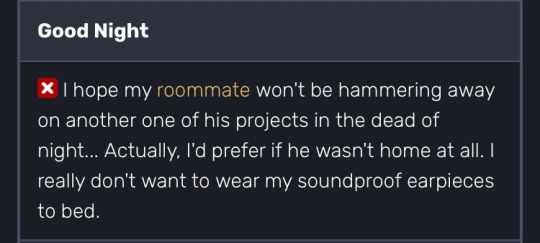

Alhaitham’s ‘good night’ voice line instantly serves as a contradiction to his character. It’s interesting, and telling, that Alhaitham, who is essentially Kaveh’s landlord, and mentions this within his fourth character story, alludes to Kaveh by using ‘roommate’ rather than ‘tenant’. ‘Landlord’ evokes a position of authority over the tenant, whereas ‘roommate’ indicates an equality between two people sharing a house – since it’s Alhaitham who advocates for the term ‘roommate’, it’s telling that, as opposed to what Kaveh believes, Alhaitham wants to establish equality between them.

In terms of what Alhaitham says in this voice line, it explicitly raises a contradiction in the form of a question: if Alhaitham is truly bothered by his roommate’s antics, why doesn’t he simply evict Kaveh?
This is relevant as this question is also posed when we initially meet Kaveh within the Archon Quest, as Kaveh states he dislikes Alhaitham’s personality, to which Alhaitham responds by saying if he bothers Kaveh so much, Kaveh always has the option to move out of the house – to which Kaveh perceives as a threat, only to then dismiss this as Alhaitham ‘changing the subject’, which seems to mean that this ‘threat’ is taken as baseless. As this isn’t called back to, this seems to be the case.


There is no real threat of eviction, and regardless of their disputes, Alhaitham ultimately gives Kaveh no ultimatum to move out. In fact, as discussed here (page 27), as we are meeting Alhaitham and Kaveh for the first time, Alhaitham allowing Kaveh to live with him contradicts his established character of living a life free of inconvenience. This instantly creates intrigue around his and Kaveh’s dynamic – who is Kaveh to Alhaitham for this exception to be made to Alhaitham’s peaceful way of life?
(An additional note of interest is that Alhaitham’s solution to the noise problem seems to be more uncomfortable than calling on Kaveh and telling him to stop his work. Alhaitham says that he’d rather not wear his noise-cancelling earpieces to bed, implying that he does so when noise is a problem at night. However, there’s no mention of Kaveh being stubborn when confronting this issue, which is why he takes to wearing his ear pieces, or any mention of confrontation at all. From this voice-line, it seems that Alhaitham avoids interaction by opting for the least comfortable option, which can be a contradiction to his character. As this is a rather brief voice-line, it’s difficult to ascertain why, but I like the idea that Kaveh is productive at night, and Alhaitham prefers not to impose on Kaveh’s work process – but this is more a headcanon than evidenced interpretation.)
Returning back to the contradiction within this voice-line, at a surface glance, this does appear to be a general complaint about Kaveh, and this can be found in Alhaitham’s lines about Kaveh, and also when discussing Tighnari. Alhaitham refers to Kaveh as ‘overly sensitive’, and ‘constantly making a fuss’.
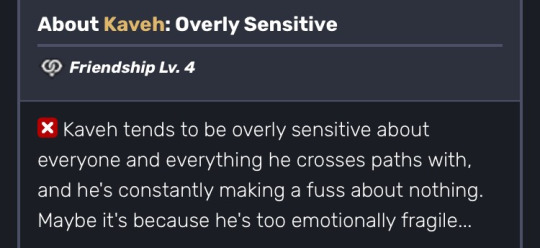
These can easily read solely as complaints, but when looking to the original CN translation, another interpretation can be found here. Alhaitham describes Kaveh as ‘caring’ or ‘tender’, which is exactly how Kaveh is described within the 3.6 special program (as per minimushiroom on twt), which can allude to how Kaveh is considerate to a fault, in that this serves as a detriment to himself.
This can be seen in Alhaitham’s other Kaveh-centred voice-line, in which he describes Kaveh buying keychains in order to provide meals for sick children, even though healthcare is free in Sumeru. Alhaitham clearly holds the view that this was a redundant action, as Kaveh, being in debt, most likely doesn’t have the money to spend on such investments that are, evidently, dubious.
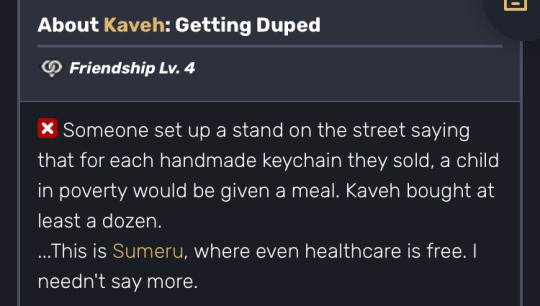
As Alhaitham provides a rational view here, this contrasts with Kaveh’s act of generosity fuelled by emotion – which highlights the contention Alhaitham has with Kaveh, in that Kaveh places himself in dangerous situations for the sake of others. However, as this can be perceived as a solely derisive line, this essential context is lacking, and can be easily misconstrued. (I think the EN translation here also coincides with this narrative, as minimushiroom notes that the original CN has Alhaitham refer to Kaveh’s sensitivity in a positive way, rather than contemptuously, as the English can be interpreted as.)
Kaveh, similarly, can be seen to complain about Alhaitham in his own voice-lines. This can be seen in the 'Good Morning' voice-line you've mentioned, where Kaveh complains about having to see Alhaitham in the morning, which 'ruins' his day. Additionally, Kaveh's voice-lines discussing Alhaitham refer to Alhaitham as ‘infuriating’ and not wanting to give Alhaitham the satisfaction of thanking him, despite Alhaitham helping him out. However, there is more nuance in these voice-lines than Kaveh simply ‘disliking’ Alhaitham, as this dislike is never stated - rather that he and Alhaitham have a difficult relationship in comparison to the ‘close’ friendship of their past.


Kaveh describes their relationship being a ‘mixed bag’, of both negatives and positives, as well as establishing a thorough understanding of Alhaitham, where other people may misinterpret Alhaitham as they ‘don’t know him well enough’. Additionally, Kaveh notes that he knows that Alhaitham can present himself in a more ‘likeable’ manner, but that Alhaitham refuses to do so, which refers to Kaveh’s contention with Alhaitham discussed within his character stories. This, in turn, generates curiosity, as it appears that Kaveh holds an in-depth knowledge of Alhaitham that the player isn’t privy to.
Referring back to Alhaitham’s ‘Good Night’ voiceline, the question raised is, if Alhaitham has a problem with Kaveh, why doesn’t he just evict Kaveh? And the answer can be found by digging further into Alhaitham’s character stories. Looking to Alhaitham’s fourth character story, it states that he is aware of the dissatisfaction Kaveh may have with their living arrangement but that ‘it matters not to him’.
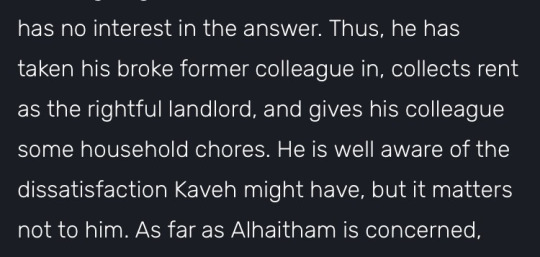
This means that he is aware that Kaveh may be unhappy with having to rely on someone else for a stable livelihood, something which his pride doesn’t naturally allow, but that this is also exacerbated due to their previous falling out and the current contentions Kaveh has with him.
At first, this can seem rather abrasive, which does fall in line with Alhaitham’s egoism as this doesn’t directly impact ‘the self’ (discussed further here), however, what immediately follows is Alhaitham’s belief that he and Kaveh are mirrors, in that his own perspective of the world will be enhanced - in the og CN, ‘completed’ -by Kaveh’s own world view.

The implication generated here with the explicit term ‘mirror’, is that, just as Alhaitham benefits from Kaveh, Kaveh, in turn, can benefit from Alhaitham. (As a side note, it is interesting then that the voice-lines in question can be seen to mirror each other – Kaveh mentions Alhaitham in ‘Good Morning’ whereas Alhaitham mentions Kaveh in ‘Good Night’.)
Returning back to Alhaitham’s character story, rather than merely reflecting each other philosophically speaking, I’d say that this also points to their respective progression as people, not just scholars.
To me, this is reminiscent of what Alhaitham says to Kaveh in A Parade of Providence – being ‘correct’, ultimately, doesn’t matter, as there is no ‘correct’ path in life, meaning that there is no ‘correct’ philosophy to shape and guide a person. Rather, Alhaitham asserts that, ultimately, their opposing philosophies are not the issue that exists between them.


The issue that does exist, then, can be surmised from Alhaitham’s actions during the event (discussed further here), in which he researches into Sachin to gauge his influence over Kaveh’s father journeying into the desert, with implicit hopes of providing closure for Kaveh, and potentially assuaging Kaveh’s guilt. This is a personal act with a personal motive; the underlying motive being concern, as opposed to an assertion of ‘correctness’.
In my opinion, I think Alhaitham’s actions during A Parade of Providence are a direct reference, and fulfilment, of Kaveh’s fifth character story. I’ve discussed here that the main reason for the ending of their friendship was them asserting the correctness of a philosophy over the other, and proposing one philosophy as the ‘solution’ to the other’s perceived flaws.
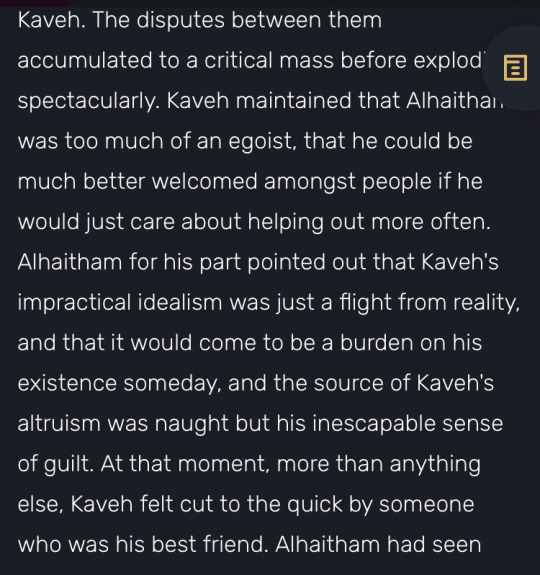

Here Alhaitham can be seen to use Kaveh’s past as the reason for his excessive altruism, implicitly referring to Kaveh’s guilt over being the supposed catalyst for his father’s demise. This final comment of Alhaitham’s appears to be the first time this has been mentioned between them, and it’s enough to be perceived as weaponisation – leading to Kaveh severing their friendship.
In A Parade of Providence, Alhaitham is shown to only have taken the role of commentator to research into Sachin, whose research we are told (by Kaveh), he has no explicit interest in, and it is heavily implied that the only reason he looked further into Sachin, was to prove to link between Sachin and Kaveh’s father. Alhaitham seems to want to absolve Kaveh of this past guilt in hopes that Kaveh will stop placing himself in the cycle of self-sabotage.
For me, when viewing this as a parallel, it highlights that Alhaitham’s motivation in speaking out during their days as students was out of concern for Kaveh, although while holding egoism as ultimately beneficial, and therefore perceivably ‘correct’. The ‘issue’ they’re currently debating is not expressly stated, and although it is unclear if Kaveh understands the implication (as discussed here), as ‘correctness’ has been overturned, there seems to be little left than the personal.
Relating this back to Alhaitham’s fourth character story, for me, Alhaitham referring to Kaveh as a mirror isn’t just referring to Kaveh as a scholar, but a person as a whole. As Alhaitham seeks to improve himself, personally, through Kaveh, it seems that he hopes to be able to benefit Kaveh in turn.
As for Kaveh’s complaints regarding Alhaitham, these can be contextualised within his own character stories. As Kaveh ultimately severed the friendship between him and Alhaitham, Alhaitham offering Kaveh to live with him, despite Kaveh revoking his previous understanding of Alhaitham (as discussed here, page 67), causes Kaveh to be overtly suspicious.
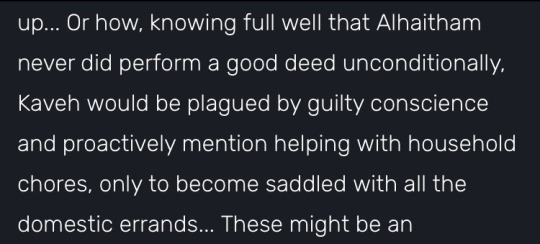
In Kaveh’s Old Sketchbook, it is mentioned that Kaveh believes there to be an ulterior motive for Alhaitham inviting him to share a house, as he believes that Alhaitham wouldn’t do something for someone else without an exchange.
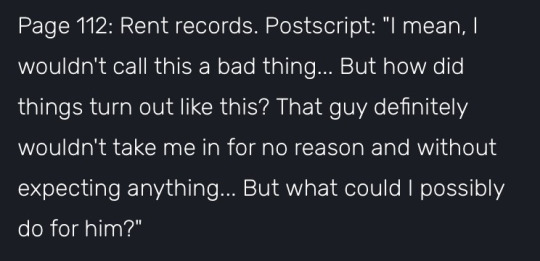
Kaveh, then, openly distrusts Alhaitham due to this unspoken motive, and although he takes on chores to ease his sense of guilt of being a perceived burden, a contention arises here. Due to their previously ended friendship, and with how Alhaitham hurt Kaveh, and how Kaveh may believe he hurt Alhaitham (discussed here), Kaveh sees no reason for Alhaitham to want him around – he treats their relationship as an exchange, asking what Alhaitham could possibly want for him.
Although Alhaitham views Kaveh as a mirror, and therefore, respects Kaveh’s perspectives, Kaveh can potentially view their opposing philosophies as a negative rather than a positive as he had done in the past (as discussed here), as it, perceivably, was what led to the end of their friendship. In this, Kaveh views Alhaitham as disparaging him and his views. As mentioned in his character story, he has no reservations in telling Alhaitham of his debt as Alhaitham has already seen through him in the past, and yet again, upon meeting at the tavern.
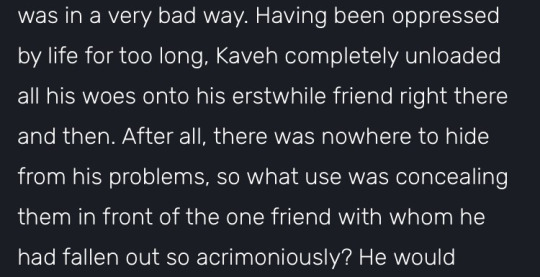
Although Alhaitham perceivably views him unfavourably, and his comments and complaints appear to propagate this interpretation, Alhaitham also seems to have no issue with keeping Kaveh around, and interacting with Kaveh, regardless of the problems Kaveh expressly has with him.
To Kaveh, it could be that as Alhaitham has already seen the worst of him, and appears to have no real issue with their stilted rapport, there is no point in donning a front and using niceties. He is open with his issues with Alhaitham, and, in turn, Alhaitham is open with him.
This appears to be a dual negative and positive for Kaveh, as he describes Alhaitham’s constancy as ‘the most unshakable part of one's past is a friend that will never change’. In this sense, his unsteady rapport with Alhaitham is reliable, and therefore, has no reason to change.

Clearly, there is a large disconnect between Alhaitham’s view of Kaveh and how Kaveh perceives Alhaitham’s view of him. As previously mentioned in the discussion of A Parade of Providence, there is an unspoken ‘issue’ between them, and this can be interpreted as dire misconceptions borne from miscommunication.
As discussed, Kaveh and Alhaitham reference each other a lot in their respective voice-lines and their character stories. This alone is enough to connect them, regardless of the cruciality of their mirror motif, as they are key figures of each other’s past, present, and seemingly, future. Despite this, it’s as you say, there’s a common perception to view them as mutually disliking each other, and, to me, this is based upon their first initial interaction, and the way they refer to each other in their own character stories and voice-lines.
It’s notable that Alhaitham refers to Kaveh in his voice-lines when Kaveh is not explicitly relevant, such as in his Good Night voice-line, and, most interestingly, when Alhaitham discusses Tighnari.

This could be because Alhaitham knows of Tighnari through Kaveh, but as this connection isn’t stated, it reads as Alhaitham mentioning Kaveh for no other reason than to complain about his perceived naivety regarding relations with others. But as this is a voice-line designated to discussing Tighnari, it’s interesting, and incredibly noticeable, that Alhaitham then discusses Kaveh instead. It’s similar to what Kaveh can be seen to do, and is observed to do by others, in relation to discussing Alhaitham.

When it comes to Kaveh, however, his complaining of Alhaitham can be seen to link with his process of dealing with troubles in his work. In his Hangout, he states that he takes his work to heart because he cares about it, which is expressed in the same quest in which Kaveh and the Traveller run into Alhaitham in the House of Daena (discussed further here, page 219).
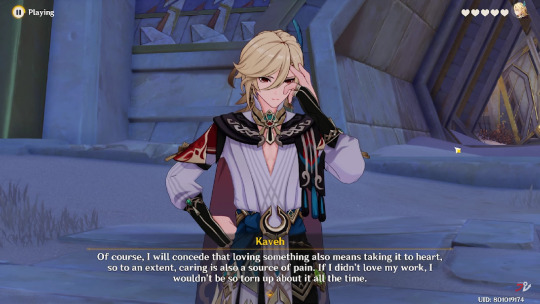
Drawing a parallel here can further contextualise Kaveh’s complaining of Alhaitham – if Kaveh truly disliked Alhaitham, there seems to be no reason for Alhaitham to remain so relevant to him, both in conversation, and in private thought. Additionally, Kaveh is described as an empathetic person, and when dealing with others, he is thusly seen to look for another perspective rather than act on his own subjective perspective.
Looking at his voice-line on Dori, for example, expresses his distaste for Dori pressuring him for Mora due to his debt, however, he also empathises with her, and states that he senses there must be a reason why Dori acts in such a way.

In contrast, this empathy can be perceived as missing in his treatment of Alhaitham, and therefore Kaveh complaining about Alhaitham can be perceived as blatant dislike – which contradicts Kaveh’s benevolence and empathy, which A Parade of Providence particularly stresses.
Kaveh’s treatment of Alhaitham can be seen as deliberately contradictory, as it can cause the player to question why Kaveh reacts in such a singular way to Alhaitham, just as why Alhaitham reacts in a singular way to Kaveh.
In reference to Alhaitham, whilst Alhaitham tends to complain about Kaveh in turn, his actions reveal him. He invites Kaveh to live with him, gives no eviction date, pays for Kaveh’s tabs willingly, (supposedly) buys wine as an apology, and goes out of his way to ensure dialogue with Kaveh – which contradicts his own character stories, in which he appears to favour solitude, and only greets those he considers his friends ‘with a nod or two’.

Moreover, Alhaitham is established as considering Kaveh a necessity to his ‘peaceful life’ he seeks to maintain (as discussed here), and can be seen to implicitly consider Kaveh one of his priorities within his Story Quest.
The idea that Alhaitham dislikes Kaveh seems to stem from Alhaitham being taken literally when voicing an opinion, or an issue, or simply joking, in reference to Kaveh – despite his character stories highlighting that Alhaitham often uses sarcasm in order to subvert expectations.

Alhaitham expressly states that he prefers to be seen as inscrutable, and unknown, by the general public, and uses subversion as a means to do so. In these character stories, Alhaitham openly encourages speculation of his own words.
Without this context, it seems easy to simplify Alhaitham to purely speaking factually when first addressing Kaveh in the Archon Quest – stating that having to explain things to Kaveh is ‘a nuisance’, and yet, it is overlooked that Alhaitham stays in the House of Daena, regardless, knowing Kaveh would find him again.
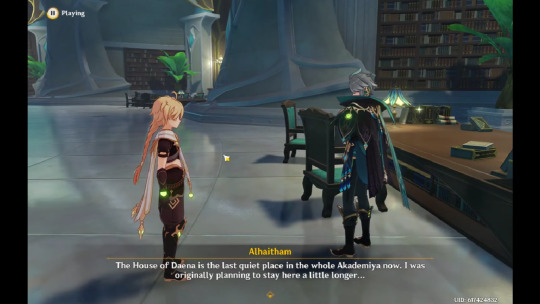
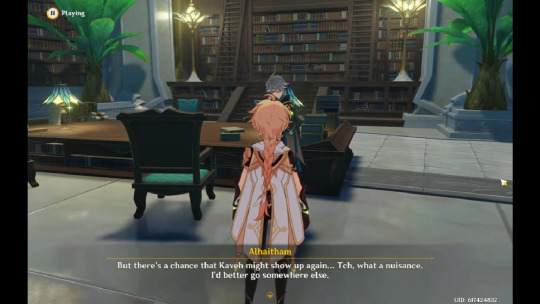
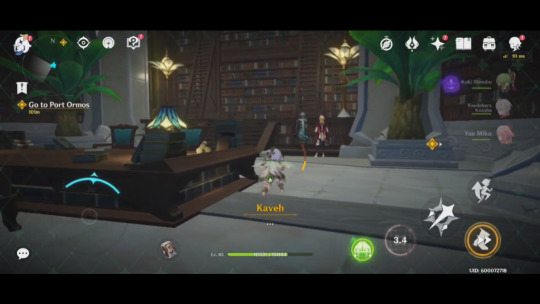
On the whole, in my opinion, Kaveh’s feelings towards Alhaitham cannot be simplified to ‘dislike’ as this is dually an inherent misunderstanding of his character, and of his and Alhaitham’s relationship, just as Alhaitham’s feelings towards Kaveh cannot be simplified to ‘dislike’ for this same reason.
In the beginning, Alhaitham and Kaveh are not supposed to be perceived as friendly, as Kaveh denies the association of ‘friends’, and Paimon describes them to the Traveller as ‘problematic’.

The reason for this is due to their character arcs being intertwined – the core issue is posed in Kaveh’s fifth character story, in that the question is raised if a compromise can be reached, if both sides of the mirror, can be balanced. At the beginning, they are entirely at odds, but even footing must be found.
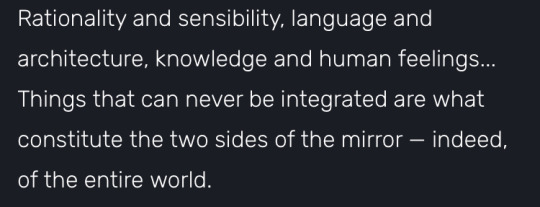
I’ve noticed a shift in online discourse after Cyno’s second story quest, as the progression in Alhaitham and Kaveh’s relationship is noticeable – deliberately, due to the flashback scene within their house (which I’ve discussed in detail here, page 122). To me, it’s more common to form the assumption that Alhaitham and Kaveh dislike each other in the Archon Quest, but with recent developments, and, hopefully, future ones, this perception is being overturned in online communities. Perhaps that’s just wishful thinking, but I’m still hopeful!
#haikaveh#kavetham#alhaitham#kaveh#genshin impact#thank you so much for your ask anon! it really ate away at my brain#haikaveh's writing is just so !?!?!? theres so many layers to peel back so a surface read of their relationship can be misconstrued as toxi#but ultimately i think these voice lines and details of their character stories are for people to question WHY they are Like That with#each other and it's one of the things i love about them that nothing is upfront or simple it really suits their themes so well#alhaitham constantly questions the world around him and flips language on its head and kaveh challenges the world with his ideals but works#with rigid principles of design and construction and he can't tell sarcasm from genuine praise which also adds to why he takes alhaitham's#words so personally... but this is improving now?? i am saying thank you cyno's second story quest <333#also the narrative that haikaveh can't stand each other seems to be more of a western thing from what i've seen online#and i think this is possibly due to the EN translation where the CN is less derisive or abrasive?#thank you to those who translate so the nuance is pointed out! <3
117 notes
·
View notes
Text
The Hitler and KKK jokes were never funny tbh
#Like Reed I was with you until then lmao#This is like the craziest virtue signalling fandom ever#Idk why some can’t just call it what it is — classism and elitism#Why must you bring real life problems that have nothing to do with anything into this#In such a trivial and un-constructive way#You’re bloating the conversation so many people seemed like they were desperate to have considering many hate Cait because ‘ACAB’#Which. respect. but then there’s no substance behind any of that. People are just reiterating very progressive and leftist talking points#spearheaded by Black people (specifically Black women) that many people like to talk over may I add!!!#without any thought behind it. Liking or disliking a character should not be your daily dose of activism#again bloating a conversation with the hyper focus on an individual instead of the big picture of the narrative#and actively ignore the presentation of other characters of colour#ok I might as well just add my tags to a reblog lmao#but yeah idk I feel like people are just lying to my face about their leftism as they make kukluxkiramman and caitler jokes#youre not being funny or clever or really much at all. You’re just saying things out loud#Also super hypocritical since a solid (deffffff not all) of the fandom treat Mel so poorly#Ok I’m done#slay on the run#arcane#caitlyn#caitlyn kiramman#caitlyn arcane#this isn’t even a Caitlyn defence post lmao people are just annoying me#ALSO most of these jokes have been off Tumblr. I’ve blocked so many people I don’t see many of these but they’re apparently popular on twt
72 notes
·
View notes
Text
A thing I really enjoy about RGU is how when producing the anime the crew was aware of the budget and limits that often come with TV shows at that time and created their own cinematographic language based on them.
The roses, the frames, the transformation sequences... Not only were they able to use them smartly but also make them reinforce the core themes of the show; that of repetition, circularity, a repeated movement, a revolution.
I personally greatly appreciate when narrative media is -meta- not in a direct way but in its semiotics. Utena creates this language based on repetition and is constantly seen subverting it, adding new "rules".
Episode 33 is cinematographicaly one of the episodes I find most interesting because they literally put the turning point of the story (I personally think of this episode as a turning point because we see Utena finally with her "prince"; except that, instead of the happy "ending" one would expect in traditional stories, it is here where everything comes into place and the grim reality is made perfectly aware. Were Utena a traditional princess story, episode 33 would mark a happy conclusion. Instead it is only the beggining of what lies inside the box and once opened it cannot be closed again) in an episode that is all about repetition. A recap.
Also, for as much as many people gloss over the Black Rose Arc I very much think it crucial to establish all of RGU's symbols. Because Utena doesn't tell us things, it wants us to learn them by noticing the patterns, by seeing the repetitions and where they are being broken, so that we ask ourselves why. The elevator sequence is one of such cases where we learn more of the characterization of these characters by seeing how they act inside of it. It's even a basic screenplay exercise: "how would your characters act trapped inside an elevator".
Mikage itself is a shadow, not just of himself but of Utena as well, an omen forever frozen in time.
Because that's another theme, shadows. And how in a way they are echoes, simplified and distorted repetitions of oneself.
And while shadows are cast in contrast, projections are cast forward. While one is a memory of something, projections are the reproduced illusion of it.
Utena works with parallels and repetitions and understanding their semantics and syntax allows us, the viewers, even subconsciously to feel their weight.
#just wanted to leave some of my thoughts out there althought these are clearly unorganized and probably on closer revision wont make sense#regarding shadows and projections we can also talk about the construction of self and how that ties to the theme of growing up and maturing#like I sair rgu has this whole narrative language that in closer inspection is just so brilliant#rgu#utena#meta#utena meta#revolutionary girl utena#analysis
152 notes
·
View notes
Text







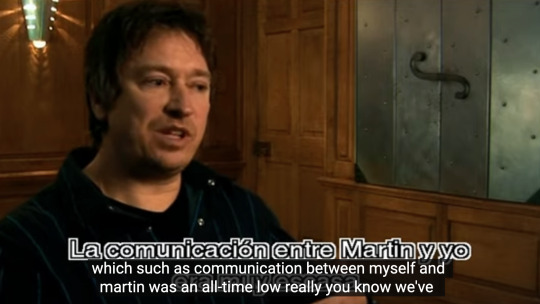



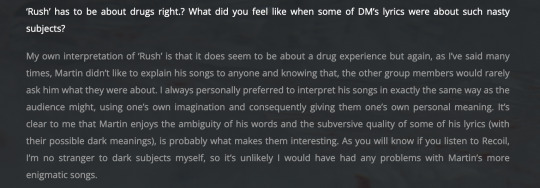



web weave for when you're a sewer gremlin who uses the walls to try and figure out these 2 freaks who passed each other like ships in the night but somehow made in your room
#me building an intricate and highly improbable narrative: construction time again!#'i wonder what it all means' ME TOO ALAN#depeche mode#alan wilder#martin gore#you (2 people) asked for it!!!
88 notes
·
View notes
Text

my beautiful girlfriend the starship aurora!! she has teeth and flesh and veins btw!! for mechanisms women's week day 4 time/space. this is because she is a woman and i like her a Normal amount
@mechanismswomensweek
[ID: A digital artwork of the starship Aurora from the Mechanisms in a style reminiscent of a construction paper craft, with paper texture and shadows to show the various "layers" of the piece. The Aurora is going upwards diagonally from the bottom right to the top left. Her grey-pink solar sail, which looks like a parachute, is extended to the top left of the image, and there is a muted smoke/fire trail coming from the bottom of the ship leading into the bottom right. The Aurora is a purple-red ship with three darker fins visible along her bottom, and light purple windows on her main body. The O'Neil ring circles her, with six separate light pink spheres representing the rooms located there. The background is dark purple and spotted with stars. End ID]
#organisation tags:#flesh moon ship#the crew of the starship aurora#(<-? i guess????)#drawn in the light of the tube sun#reach tags:#the mechanisms#the starship aurora#digital art#construction paper art#described#mechanisms women's week#notes: i was gonna do a tear in it with a flesh diagram beneath this drawing but i got a bit overambitious and it did Not work#this is a bit late because i have also gotten overambitious with the other prompts... for narrative im working on a raphaella fic#abt why she doesnt have a song and for the adventure album there's a fic abt gwen meeting saxons when leavin home#and then a massive pencil drawing of really minor women in all the albums n such. i can't put them down because ive started#bits and pieces of all of them and i love them dearly already..#anyway hiii aurora!!!!!! love u 💗💗💗#btw ive been playing paper mario lately can you tell
78 notes
·
View notes
Text
david oakes doesn't get enough credit for how he palpably portrayed juan's mental health deterioration. the crushing pressure of the expectations for the role he was thrust into combined with his brother's deadly envy that magnified his failures left him feeling desperately alone, betrayed, and manipulated by his family to the point where he held a knife to his neck willing to kill himself in front of his father because it was the only way to prevent him from ripping his position (aka his dignity and entire sense of being) away from him and hand it to the one who betrayed them, sought to break him down and seize everything from him... Acting™
#when you're the main guy but also not the main guy and the narrative is constructed against you#“i defend this family with my heart and with my soul”#juan's always chasing after his family’s love but it’s no useee#i love all things that give me pain i fear#also david oakes brilliant as fuck i ended up watching his entire ass filmography (which is all fun btw)#juan borgia#the borgias#david oakes#tb text post
31 notes
·
View notes